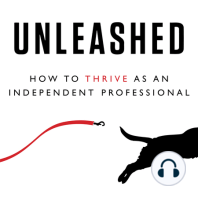61 min listen

561. Why and How to Become an Adjunct Professor
FromUnleashed - How to Thrive as an Independent Professional
561. Why and How to Become an Adjunct Professor
FromUnleashed - How to Thrive as an Independent Professional
ratings:
Length:
55 minutes
Released:
Feb 27, 2024
Format:
Podcast episode
Description
Show Notes: In this episode of Unleashed, the panel discussion focuses on the pros and cons of becoming an adjunct professor. The panelists discuss the motivations behind teaching courses as an adjunct professor, how to get hired, whether to teach in traditional MBA programs or other certificate or degree programs, the amount of work involved, typical pay, relationship building opportunities, project opportunities, and ancillary benefits such as access to datasets or research services. The discussion kicks off with Adam Braff, a data analytics executive/advisor, shares his reasons for teaching, stating that the best reasons to teach are not practical instrumental reasons but more passion and love for teaching and believes it is a creative act. Mary Kate Scott follows Adam. She teaches at the University of Southern California, Marshall School of Business in the MBA program, and Keck School of Medicine, focusing on healthcare. She has taught the business of healthcare, innovation and health care, new business models in health care, entrepreneurship and health care, and medical device business models. Mary Kate also shares her background with Procter and Gamble and later joined McKinsey for two years to become a better professor. She found she loved the position and stayed there for seven years, but she states that she found the joy of teaching to be both inspirational and fun. She enjoys the level of engagement and interaction in her classes. Sven Beiker teaches Strategy Making in an MBA program at Stanford Business School, and also at a university in Sweden about AI and product development. He discusses his experience teaching at Stanford and their passion for teaching. He began his teaching career at Stanford which led from a position as an automotive program manager. He also enjoys working with younger people, finding it intellectually stimulating. He has also found the position to be an asset in branding, and has found that it helps in terms of being considered as a keynote speaker from Stanford Business School. Mohannad Gomaa shares his experience teaching at US Navy PostGraduate School, which was motivated by a contract with a colleague and his subject matter expertise. He designed and delivered the curriculum. He has also taught in consulting colleges, and recently, he was authorized by the Association of Supply Chain Management to teach supply chain certifications, including the CSCP certified supply chain professional certification. This allows him to associate with a reputable knowledge body and meet with stakeholders interested in his work. He has also signed an agreement to be a consulting partner for the ACM, which will allow him to explore more opportunities across industries. He believes teaching is a passion that can generate revenue beyond the passion. An adjunct professor at the University of Copenhagen shares her passion for teaching consulting and adds to her reputation for expertise in her field, but she finds teaching fun and energizing. How to Secure a Position as an Adjunct Professor The conversation also touches on how to get started as an adjunct professor. To do this, one should be flexible about the institution they want to teach in and focus on the dimensions that are necessary to their field. Many schools have executive MBA programs and masters of leadership programs and other programs that are growing and need teachers who can teach their specific subject matter area and create and pitch syllabuses. To reach out to the right people in these institutions, one should reach out to the Academic Director of different degree programs. This person will be responsible for the substantive side of these programs and can help with informational interviews. For example, if one wants to teach in New York City, one could reach out to HR or the dean of the school. Mary Kate discusses the benefits of adjunct teaching, including the joy of publications, networking, and credibility. She suggests starting as
Released:
Feb 27, 2024
Format:
Podcast episode
Titles in the series (100)
25. Josh Spodek on leadership step by step: Our guest today is Josh Spodek, the author of . Josh is an independent professional who coaches individual clients teaches leadership and entrepreneurship as an adjunct professor at NYU does speaking engagements runs online courses in leadership and... by Unleashed - How to Thrive as an Independent Professional